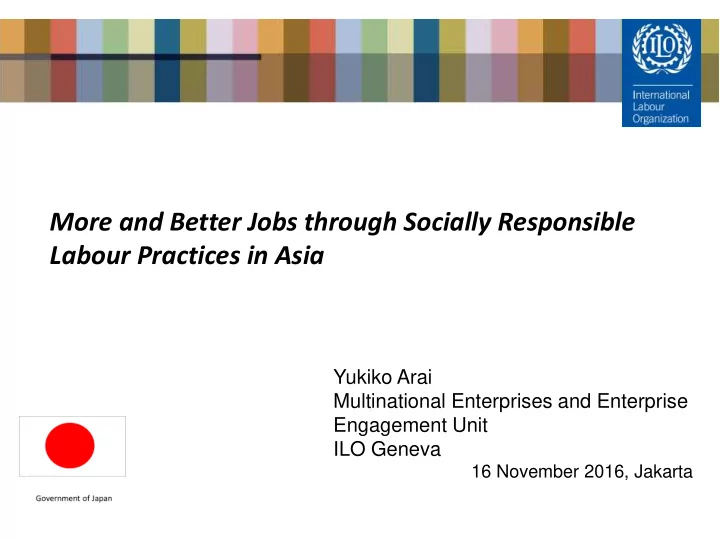

More and Better Jobs through Socially Responsible Labour Practices in Asia Yukiko Arai Multinational Enterprises and Enterprise Engagement Unit ILO Geneva 16 November 2016, Jakarta
Socially responsible labour and business practices Competitiveness enhancing Win-win solutions for MNEs, local enterprises, and workers. Dialogue at all levels 2
ILO MNE Declaration • Socially responsible labour practices amongst MNEs in the host countries of their operations – Equally applicable to domestic companies • Underpinned by International Labour Standards • Distinct roles of government and business • Includes the 4 Fundamental Principles and Rights at Work • 5 topic areas : General Policies, Employment, Training and Skills, Conditions of Life and Work, Industrial Relations
ILO MNE Declaration • Most comprehensive global instrument on the labour dimension of social responsibility of business • Aim: Maximize the positive contribution of Foreign Direct Investment and business to socio-economic development • Principles indicate «good practices» for business, but also responsibilities for governments • effective industrial relations, dialogue and consultations as the key mechanism to achieve positive outcomes
More and Better Jobs through Donor: Japan Socially Responsible Labour Practices in Asia Japan: role of the home Viet Nam country of FDI/MNEs Electronics sector Myanmar Hotel/Tourism sector Pakistan Indonesia Sports Goods sector Hotel/Tourism sector Foster a partnership approach between MNEs and their direct suppliers on advancing socially responsible labour practices in the target countries.
Country level action in applying the principles of the MNE Declaration • Research • High-level policy dialogues • Seminars with business • Labour Administration, capacity building of labour inspectorate – promote enterprise level dialogue • Promote dialogue between home and host countries of FDI/MNE • Documentation and sharing of good practices • ILO Helpdesk for Business on International Labour Standards http://www.ilo.org/business 6
“More and better jobs through socially responsible labour and business practices in the Electronics Sector of Viet Nam ”
Some interesting facts … An MNE-driven export oriented value chain • Out of the largest 100 enterprises, 99 are FDI • The largest 20 enterprises employ 49.4% of all workers ( largest 50 employ 69% , largest 100 employ 82% ) • Out of the largest 20 enterprises, 11 are Japanese , 4 Korean , 3 Taiwanese , 1 American, and 1 which country of origin is unidentified.
Model cases of socially responsible labour and business practices win-win solutions for MNEs, local enterprises, and workers. 9
Building trust and strengthening commitment (Panasonic) • Establishing long term relationships with their workers as well as with their suppliers • One of the most important objectives for MNEs is to attract and retain the workers to establish relationships that are stable and long-term based to build and accumulate capacity for tacit knowledge (high skilled workers) • Improving workers’ opportunities to achieve a better work - life balance, prioritizing on issues that were deemed as important from the workers perspectives. • The key to this was to hold regular dialogue between management and workers, and to genuinely commit to the outcomes of such dialogue. 10
Aligning competitiveness and socially responsible practices (Fuji Xerox, Apple and Foster Danang) Strong commitment of an MNE to build capacity of its supplier firms in terms of socially responsible corporate conduct Example of Fuji Xerox: CSR procurement support: self-check exercise using CoCs, MNEs provide technical support to overcome shortcomings • Primary motivation: not to prepare their suppliers to properly abide by the CoC per se , but to prevent the occurrence of “ line stop ” at both the suppliers and their own • Main reasons for disruptions: worker-employer disputes related to working conditions (and the strikes that follow) - have strong effects to competitiveness of the suppliers and MNEs. • Systematic cost-benefit analyses based on quantitative data suggest robust and positive correlations between such practices and profits 11
Aligning competitiveness and socially responsible practices (Fuji Xerox, Apple and Foster Danang) - contd. Example of Apple and Foster Danang: an win-win engagement through social audit based on Apple CoC, corrective action verification system that also help address strategic business issues • Engagement with suppliers as one of the key sources of overall competitiveness – Business model based on mutually dependent structures between buyer MNE and suppliers • Process as a tool to engage and build trust based relationship with suppliers; not just as as a tool to build capacity of suppliers Key conditions for success: Level of trust embedded in interfirm relationship between buyer MNEs (Apple and Fuji Xerox) and their suppliers (Foster Danang, in the case of Apple). Built and maintained through regular dialogue. 12
High Level Tripartite-Plus Policy Dialogue on 29 September 29 2016 in Hanoi 13
Joint Tripartite Statement & ‘National Plan of Action’ • Develop capacity of educational and training institutions • Marginalization of Vietnamese enterprises, particularly SMEs, in the global electronics value chain • Working conditions, especially in SMEs • Potential inconsistency between laws and policies that affect the performance of MNEs, local Vietnamese enterprises, and the workers Dialogue involving MNEs 14
1a. Dialogue: between workers and employers (intra-firm) Who? Employers and workers What/why? Discuss issues related to employment and working conditions Goal: Achieving win-win for workers (better working conditions) and for employers (higher productivity) 15
1b. Dialogue: between enterprises (inter-firm dialogue) Who? Buyer and Supplier enterprises What/why? Technology and knowledge transfer from buyers (MNEs) to suppliers (MNE/Local enterprises) important to promote win-win outcomes Goal: Collective efficiency gains 16
1c. Dialogue: within a “tripartite - plus” structure Who? Workers, Employers, Government and MNEs What/why? While MNEs play major roles in structuring the electronics industry, it currently is not part of the dialogue structure – opens possibilities for better dialogue on issues such as FDI attraction and local enterprise development Goal: A platform for dialogue which includes voices of MNEs is needed Further issues : how to create links with MNE HQ in their home countries? > Roundtables with Japanese electronics MNEs 17
Recommend
More recommend